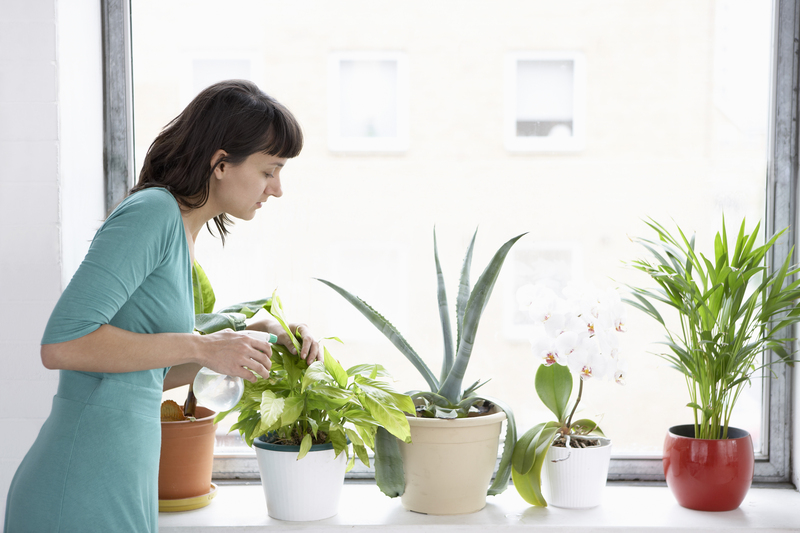Garden Herb Keeping Tips
Posted on 25/03/2025
Growing your own herb garden can be an immensely rewarding venture, providing you with fresh ingredients right at your doorstep. However, cultivating and maintaining a healthy herb garden requires some know-how and consistent care. This guide covers essential tips and tricks for keeping your herb garden flourishing throughout the year.
Selecting the Right Herbs
Choosing the right herbs is the first step in establishing a successful herb garden. Start by focusing on herbs that you commonly use in your cooking or home remedies. Common herbs like basil, parsley, cilantro, rosemary, and mint are often a good choice for beginners.
- Basil: Perfect for Italian dishes and easy to grow.
- Parsley: A versatile herb for various cuisines.
- Cilantro: Essential for Mexican and Asian dishes.
- Rosemary: Great for adding flavor to meats and stews.
- Mint: Ideal for teas and mojitos, can be invasive so requires careful management.

The Importance of Soil Quality
Soil quality is paramount for the health of your herb garden. Herbs thrive in well-drained, nutrient-rich soil. Using a good quality potting mix enriched with compost is recommended. If planting directly in the ground, consider conducting a soil test to check for pH balance and nutrient levels. The ideal pH level for most herbs is between 6.0 and 7.0.
Optimal Sunlight and Watering
Herbs generally require plenty of sunlight, typically at least 6-8 hours of direct light per day. Position your garden in an area that receives maximum sunlight. When it comes to watering, herbs prefer a 'deep but less frequent' watering schedule to encourage strong root development. Overwatering can lead to root rot and other issues.
Pruning and Harvesting Techniques
Regular pruning is crucial for maintaining the health and vigor of your herbs. Prune your herbs to encourage bushier growth and to prevent them from flowering, which often results in a decline in leaf production.
- Basil: Pinch off the top sets of leaves regularly to encourage bushier growth.
- Mint: Cut back frequently to keep it contained and vigorous.
- Rosemary: Avoid cutting into the woody part of the stem as it won't regrow from there.
Controlling Pests and Diseases
Herbs can be susceptible to pests such as aphids, spider mites, and whiteflies. Integrated Pest Management (IPM) techniques like hand-picking, using insecticidal soap, or introducing beneficial insects like ladybugs can help control these pests. For diseases like mildew or fungal infections, ensure proper air circulation and remove any affected parts of the plant.

Companion Planting
Companion planting can significantly benefit your herb garden. Certain plants, when grown together, can help repel pests or improve each other's growth.
- Basil and Tomatoes: Basil can help improve the flavor and growth of tomatoes.
- Rosemary and Beans: Rosemary repels bean beetles and other pests.
- Mint and Cabbage: Mint can deter cabbage moths and other pests.
Indoor Herb Gardening
If outdoor space is limited, consider growing herbs indoors. Use containers with good drainage and place them near a sunny window. LED grow lights can be a viable alternative if natural sunlight is insufficient.
Tips for Successful Herb Gardening
1. Start Small: Begin with a few herbs that you frequently use and expand as you become more comfortable with your garden.
2. Use Quality Containers: Ensure your pots have good drainage to prevent root rot.
3. Regular Maintenance: Consistently prune, water, and check for pests and diseases.
4. Label Your Plants: Use markers to label each herb to avoid confusion, especially when starting.
5. Rotate Plants: Occasionally rotate your pots to ensure even sunlight distribution if growing indoors.
Pros and Cons of Herb Gardening
Pros
- Freshness: Access to fresh herbs enhances the flavor of your meals.
- Cost-Effective: Growing your own herbs can save money in the long run.
- Therapeutic: Gardening can be a relaxing and fulfilling hobby.
- Sustainability: Reduces the need for store-bought herbs and packaging waste.
Cons
- Time-Consuming: Requires regular attention and maintenance.
- Pest Issues: Susceptible to pests and diseases that need management.
- Space Requirements: Can require ample space, particularly for larger varieties.
Takeaways
- Choose herbs based on your culinary needs and growing environment.
- Ensure good soil quality, adequate sunlight, and proper watering.
- Regular pruning and pest control are essential for a thriving herb garden.
- Consider companion planting to optimize growth and deter pests.
- Indoor herb gardening is a viable option for those with limited outdoor space.
Conclusion
Keeping an herb garden requires commitment but offers numerous rewards, from the satisfaction of growing your own food to the enhanced flavors in your cooking. By following these tips, you can create a productive and beautiful herb garden that meets your needs. Whether you have a sprawling backyard or a small apartment balcony, with the right care and attention, you can successfully grow your own herbs and enjoy the myriad benefits they bring.












